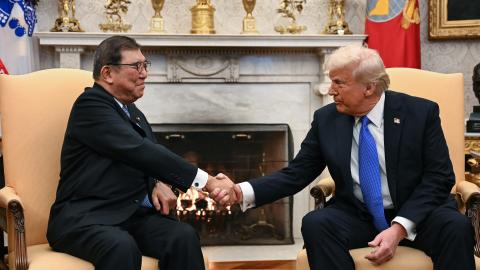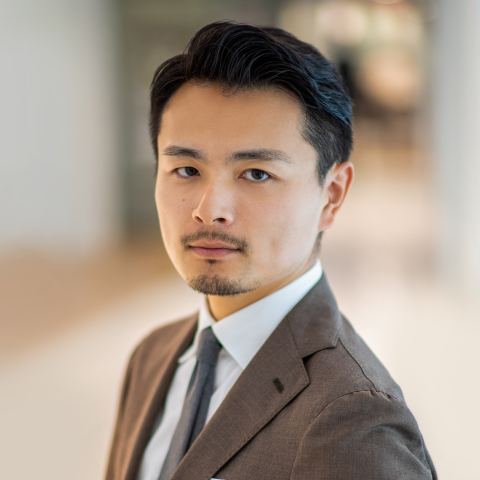
In-person attendance is by invitation only.
Event will also air live on this page.
Inquiries: mdewitt@hudson.org
A Conversation with Deputy Secretary of State Kurt Campbell: The New Era in the US-Japan Relationship
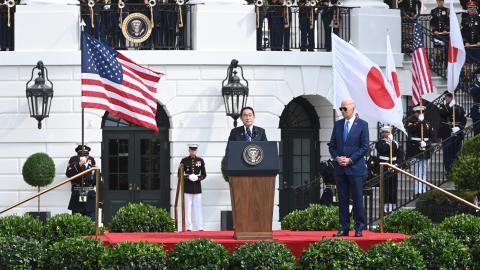
In-person attendance is by invitation only.
Event will also air live on this page.
Inquiries: mdewitt@hudson.org
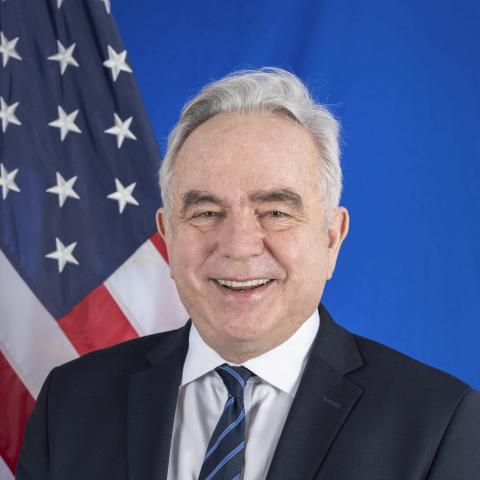

Asia-Pacific Security Chair
Patrick M. Cronin is the Asia-Pacific security chair at Hudson Institute. His research analyzes salient strategic issues related to US national security goals in the Indo-Pacific region and globally.
The historic April summit between President Joe Biden and Prime Minister Fumio Kishida signaled a new era in United States–Japan relations. The summit produced agreements for enhancing economic ties, advancing technological innovation, coordinating diplomatic efforts, and strengthening security cooperation.
The president said that this is the most significant upgrade of the US-Japan alliance since it was first established. This upgrade comes at a critical juncture when the democratic nations of the world need to have all hands on deck. President Biden has made it clear that Japan is already standing shoulder to shoulder with the United States.
Deputy Secretary of State Kurt Campbell will join Hudson Asia-Pacific Security Chair Patrick Cronin to examine the new outlook for this key alliance.
Event Transcript
This transcription is automatically generated and edited lightly for accuracy. Please excuse any errors.
Joel Scanlon:
Good morning. Thank you for joining us. I’m Joel Scanlon, executive vice president here at Hudson. Since its founding more than 60 years ago, Hudson has championed a strong and vibrant Japan and another stronger US-Japan relationship. From defense cooperation to collaboration and science and technology, to greater economic ties, to trade and foreign direct investment, no relationship is more important to security and prosperity than the US-Japan alliance. The evolution of the relationship in recent years has been dramatic. The April summit between President Biden and Prime Minister Kishida served both as a combination of the efforts of our countries and a potential launch point for what the president and prime minister termed a new era. It is my great pleasure to welcome back to Hudson, although I think maybe for the first time in his current capacity, deputy Secretary of State, Kurt Campbell, to discuss the Biden administration’s views on the summit’s achievements and the next steps for US-Japan cooperation.
There are a few people in Washington who have played a more fundamental role in shaping and guiding the US-Japan alliance and, really, shaping and guiding the US alliance network through the Indo-Pacific more broadly than the Deputy Secretary. He’s in conversation today with my colleague, Patrick Cronin, Hudson’s Asia-Pacific security chair. Patrick, over to you.
Patrick Cronin:
Joel, thank you so much. And Kurt, welcome to Hudson. Really a great honor for us to have you here as Deputy Secretary of State now. Joel’s just talked about the great success with the Prime Minister’s visit. We’re in a new era of US-Japan relations. In what ways are we in a new era? What is most interesting and important for you? Because this was an alliance, we’ll remember, it was focused largely on the defense of Japan, we were the sword and they were the shield, the military superpower versus a civilian power, we were the hub and they were just one of the spokes, but now this combined alliance represents comprehensive power in a way that we haven’t seen before. But, I mean, that’s how I see it. But how do you present this new era in US-Japan alliance?
Kurt Campbell:
Great. First of all, let me just thank Joel, my good friend Walter and my old friend Patrick Cronin for having me here at Hudson today.
I will say that we were the beneficiary of a series of meetings held here at Hudson over the course of the last couple of years in which we brainstormed. At the time we thought these were things that might be possible, but in the far distant future, in reality, if you look at the list of very substantial, what we call in sort of Washington-ese, deliverables. Many of those originated in the conference room here at Hudson as we strategized about the way forward. And I do want to thank the colleagues here for support and ingenuity associated with taking this critical bilateral relationship to the next level. So first, Patrick, I would simply say I agree with Joel that I think the term historic is thrown around a lot, but I do believe that this is an historic summit in many respects, and it, basically, I think, highlighted the shift in Japanese strategic thinking. And we saw many manifestations of that over the course of this expansive three or four day visit in the United States.
First, what was clear, Patrick, and you alluded to it in your question, Japan’s perspective, its world view is increasingly global. If you had to say who gets at least a degree of credit for the vote over the weekend, and then last night associated with the passage of the supplemental. I’ve had a chance to talk to a number of people on the house side that were quite moved by Prime Minister Kishida’s speech. And I would just highlight for you all, in that speech, he talked not just about the challenges in the Indo-Pacific, but why the most central important task from a Japanese perspective was continuing our support and engagement both in the Indo-Pacific and in Europe on the critical tasks in Ukraine. And a few of the congressmen said it brought home to me the linkage that exists between these two distinct geographic theaters, but have many shared commonalities in terms of how they think about the operating system that both regions operate within.
And so I think what happened in those discussions, Patrick, was a series of initiatives in the Middle East, in the Pacific, in Africa, in Haiti, and particularly in Ukraine, which underscored Japan’s commitment to be a serious and sustaining partner of the United States. I will say, I’ve rarely seen anything like it, and so I would go as far to say Japan was always a critical and vital partner. I think in many respects it is our most important bilateral partnership on the planet, and it was exemplified by that week in Washington. I’ll also say that in many respects in the past, Patrick, it was the United States encouraging Japan to take steps, increase its defense budget, think seriously about extending its soft and hard power outside of just the narrow confines of Northeast Asia. But what we saw clearly was Japan pushing us.
So there are manifestations of the US-Japan relationship that were formed 70 years ago that need to be updated, that Japan has to be more integrated into how we think about operational concepts and actual application of military power. And the Japanese are demanding that they want some rethinking of how planning and operational concepts are developed. They want them not just done in the United States and Hawaii, they want them done in Japan. Completely appropriate. It will challenge us. We will need to think carefully how we make some of those changes. But Japan is engaging us in an incredibly effective way. I will also say what was striking to me, Patrick, like you and I have both worked on this relationship for decades, literally decades now. It’s hard to say that . . .
Patrick Cronin:
Don’t rub it in.
Kurt Campbell:
I’m trying not to. But the sense of trust and confidence is real. I’ll also just point out here that this is one of the singular relationships that enjoys an enormous amount of bipartisan support in Congress. One of our strongest supporters, Senator Haggerty, others were key players in driving deliverables for this summit. So I don’t think it’s an exaggeration to say that this was a historic, it sets the scene for an expansion of our multilateral framings. You all seen the day after we held a trilateral, first ever, with the Philippines, with President Marcos. In all of these evolving, new and hopefully innovative architectures, in almost every single one, Japan plays a central key, leading role.
Patrick Cronin:
I want to just step back those past three decades because the role you played has been absolutely essential in making this alliance adapted to the post-Cold War world and to the world we’re now entering. And I remember flat panel display disputes with the Japanese, right? I mean, that was the big issue at defense department coming into the Clinton administration.
Kurt Campbell:
FSX fighter planes.
Patrick Cronin:
FSX disagreement over joint fighter building program. They became the ATM of the Gulf war. We were criticizing them after the fact. Even though they gave a lot of money, but then they were not participating. And we were pushing them about the Russians in the north saying, “Hey, ease up, Japan. They’re no longer the threat. The Cold War’s over.” But there you were with people like Joe Nye and Rich Armitage.
Kurt Campbell:
And Patrick Cronin.
Patrick Cronin:
And a lot of our friends, David Asher and Michael Green and Sax Dakota and Paul Jar and many others. But we were trying to look long-term, not even just at the North Korean missile threat that was emerging. But you saw this early on, you saw the potential, you knew this relationship would be vital, and you managed to pull together for the last few decades consistently, never changing, this idea that would become the free and open Indo-Pacific that we, of course, borrowed from the Japanese in terms of the phrase, but the idea was already there, and I just want to appreciate that journey.
Kurt Campbell:
Look, Patrick, and the truth is that is not an individual journey. There are a lot of people who led the way, who inspired, and Patrick, I was on that journey with you. I remember engaging in Japan in the early 1990s. But since this is a group that’s interested in strategy, I’ll give you a sense of how I would look back in this in terms of perspective. In truth, there has always been a remarkably small number of people that are really deeply engaged in sort of the strategy of Asia. There are large groups that focus on Europe and on the Middle East. The dominant group strategically that sort of formulated how to think about the Indo-Pacific for decades really put, at the core, at the center of our strategy, the US-China relationship. And the idea was that this was the stuff of really big power thinking.
And you don’t have to look far at the number of the most esteemed strategists that were involved in the elements of that bilateral relationship. I think we had one perspective of it, but the way often the Chinese interlocutors used that perception was to make other nations in the Indo-Pacific, in Asia, surrounding them uncomfortable. I think there was a much smaller group that began in the aftermath of Vietnam that believed that the best way to think about strategy was not inside out, but to work with partners central of them, Japan and others, to try to shape the environment around China. That was a very small and hearty group of folks. Rich Armitage, Joe Nye, Patrick, Mike Green, there were a few of us. I see . . .
Patrick Cronin:
Jim Przystup here as well.
Kurt Campbell:
Jim’s here. I see Jim and his son. This was a small group that generally was involved in the operation of the US-Japan relationship, which is often tactical about specific operational things. But if you jump forward from the 1990s in which they were deeply involved in an effort that tried to make the argument about the relevance of the US-Japan relationship, even in a post-Cold War world, then that was a near-run thing. It was very challenging in the aftermath of the tragic rapes in Okinawa in 1995, a lot of rethinking in Japan about whether they wanted a different kind of relationship with China, thinking more about international institutions and maybe downgrading the US-Japan relationship through this period.
What we now see 35 years later is that that first school is not nearly as relevant in the formulation and execution of US foreign policy. And the second school, which was once a relatively small school, is now utterly and completely dominant in the Democratic Party. And in some, I would say half of the Republican party, the irony is that this effort, this idea of working in a bipartisan context, was probably originally an internationalist Republican concept, and it is relatively well accepted there. And I think the big struggle about foreign policy and national security is actually going to be between those two groups, which we saw on full display over the last couple of days. The internationalist Republicans working, entrusting, working with allies and partners. And those that believe that the United States is better off operating Independently, not encumbered with allies and partners and can focus both on domestic and then act alone more decisively.
I think what we are involved in right now, Patrick, is a decisive effort that involves not just Japan but other countries in the Indo-Pacific and Europe to do a proof of concept to show that it is possible and it improves American security to work closely and actively with allies and partners.
Now, in truth, if I can just say that this sounds great in theory and practice, but it requires huge changes in how we go about engaging with partners. There is a degree of paternalism in some of these relationships. Increasingly, partners demand to be treated more as equals, have a voice in how policies are formulated. That’s entirely appropriate.
It is also the case that it was only a little over a decade ago that the abiding belief on certain technologies and military equipments was that we should be careful about the proliferation, even to our allies and partners, and that we should not allow those capabilities to flow from the United States to other countries, and we should guard them and put procedures around them carefully. That is in the process of being shifted substantially, in which I think the new belief is that it is critical that we are able to work on technology and militarily, co-production and the like, with key allies and partners. And that that process not only creates greater capacity in an environment where we are experiencing substantial bottlenecks and the like, but it also allows us to work in greater harmony in developing joint efforts like AUKUS, right?
Patrick, what we’re involved with now is literally a reconceptualization of many of the procedures and practices that had inhibited some of these closer relationships. And I will say it was China first who understood that the commanding heights of global preeminence would be founded on technology. And he understood that, frankly, more clearly than many other countries. But now we recognize, for us to maintain our position, to sustain this cohort of countries and to preserve the operating system, we need to be able to work across borders on key technologies like 5G, like AI, and to create the incentives to ensure that appropriate investment and innovation continue to happen here in the United States.
What we’re seeing, Patrick, is not just the United States and Japan stepping up, but other countries also taking substantial steps. If I had to say the thing that I think holds the greatest hope and promise in the next period ahead is if we are successful in continuing the path and pace of rapprochement between Japan and South Korea. If that can continue technologically, politically, strategically, people to people, that will have probably the most far-reaching consequential improvement in our partner engagement in the region. Sorry, that’s long answer.
Patrick Cronin:
No, it’s a great answer. You’re giving away some of your secrets without knowing it in terms of being unrelenting, relying so much on allies and partners, trying to achieve strategic effects, not just chasing the immediate issue, and personnel, people have been so important and they’re important to you right now at the State Department.
Kurt Campbell:
Yeah. I would also say, guys, the other thing that is striking, it’s easy to get the challenges, when we were just talking with Walter me and we’re joking around a little bit. And it is a challenging, dark, international environment and there are moments of discouragement. But at the same time, I am struck, I see the up-and-coming, younger strategists, well-trained, understanding of the Indo-Pacific in a way that many of us were not a few decades ago.
And that capacity building that is underway in Australia, in Japan and South Korea and other countries in the Indo-Pacific, and particularly in the United States, is critically important. It means not only understanding, like for me, if you ask what are the critical components of this, it’s a degree of mastery of regional politics. And in truth, many of the people that have come to work on the Indo-Pacific more recently come from the Middle East. Limited, frankly, applications, lots of differences. Very different cultural backgrounds and the like. But understanding the Indo-Pacific is going to be critical.
But also having an understanding of key technologies. You don’t need to be able to devise and divine how semiconductors work, but understanding cutting-edge technologies, areas that we have to be wary about, about certain capabilities slipping into other hands and how we take steps to advance our interests, those are going to be critical areas of capacity building.
Patrick Cronin:
You’ve rightly underscored that technology competition is sort of a fulcrum of competition with China, but in terms of the US and Japan, trying to portray a strong alliance that is not in contradiction with China’s prosperity, and yet is very much in competition over technology. It’s also in competition increasingly in the global south, so-called.
Kurt Campbell:
Yeah.
Patrick Cronin:
Right? And Liz Economy has a great piece in the Foreign Affairs this week talking about how we need to learn from China’s playbook because there are a lot of countries out there who don’t have the voice, who don’t have the development, and they’re looking for alternatives. Do US and Japan help provide the basis for an alternative? Whether it’s the Belt and Road Initiative or China’s general appeal to the global south?
Kurt Campbell:
I agree with Liz that there are always lessons to be learned in any circumstance. I will say that the country that I think the United States can study carefully with respect to the global south is Japan. And I think Japan’s strong soft power and people-to-people engagement in Southeast Asia and Africa and other parts of the Pacific has been hugely both instructive and helpful to the United States going forward. And I do agree that this is an area where the United States will need to step up its game, and we face enormous challenges in the next little while.
One of the topics of conversation between the United States and Japan is exactly how to go about doing that, and diagnosing the nature of the problem is critical. I think sometimes, Patrick, we get a little lazy by saying global south. The truth is that the issues that confound the Pacific Islands, which, in many respects, are global south nations, are different from Africa and are different from Latin America. And understanding and diagnosing specifically what are the areas that we can focus on that will advance our narrative and engage on issues that are of significance to those populations are critical. And frankly, Japan has helped in that.
Patrick Cronin:
No, I agree entirely. I’m just echoing the Chinese talking point that you’re creating these small circles, these sort of nefarious small circles in international affairs as opposed to what? A big hegemonic bully? Or their appeal to the so-called global south.
Kurt Campbell:
I would also say that almost all of these countries desire a good, stable and steady relationship with Beijing.
Patrick Cronin:
They do.
Kurt Campbell:
And Japan is no exception. I will tell you, our engagements with Philippine friends make clear that they too want good neighborly relations. I think many of these countries are exploring these engagements with the United States because they feel this is their best option to secure an environment that has become more difficult.
But can I, Patrick, can I just also, we’ve highlighted the security dimensions of the US-Japan Summit, but I will underscore there were so much more than that, focus on investment, on renewed education. I was, earlier efforts, we had many more Japanese students in the United States. Those have declined substantially, diagnosing why, trying to affect that. Ambassador Emanuel launched a major new educational scholarship named after former Secretary Mineta. We did a number of things that I think, you work on a summit on a lot of big things, and then you do something that you think, “Well, it’s interesting,” and it turns out to sort of capture hearts and minds.
I’ve heard more from people about the Japanese decision, very gracious decision. They had read that a number of cherry trees that were in one of the subsequent tranches gifted by the people of Japan to the United States in the 1950s were going to be cut down along the tidal basin as it was going to be rebuilt. And Prime Minister Kishida and his team took the initiative, reached out to us. It’s not easy bringing trees into the United States. We took the necessary steps and they’re going to donate hundreds of trees to help repopulate, as a gesture of friendship. And when you think about the greatest gifts that have come to the United States from foreign friends, you’d have to say the Statue of Liberty and cherry trees are the two most gracious gifts. And nothing more important than that.
So these trees are going to be taken down. We will donate some of the wood to woodworkers in both Japan and the United States to make things that will signify the US-Japan relationship. And then we will also look forward in celebrating these new plantings once the work on the tidal basin is done.
There were a number of things like that that basically appeal and underscore the connectivity between our two countries. I think it is also the case that the Cherry Blossom Festival here is now the largest attended group that is hosted in Washington every year. A love of Japanese culture and not a little bit of sake drinking.
So I think it signifies not simply, Patrick, a sort of a narrow security basis, but a broader appeal. And if you look at public opinion polling, attitudes towards the other have never been stronger. And Patrick, you and I were present in periods in which attitudes of Japan toward the United States and vice versa were quite low and animated by anger and a sense of economic distress. So I’m very pleased with this.
Patrick Cronin:
You’re absolutely right. These two countries are making each other better and more complete. And yet the security side is not just from us, so I do have to mention Prime Minister Kishida is instituting an incredible sort of turn for Japan’s defense in terms of spending, introduction of counterstrike weapons, the new national security strategy, his willingness to speak to Congress in the divided America about the need for aid to Ukraine. And all of those represent a change. Yes, maybe Shinzo Abe would’ve said them, but you wouldn’t have expected Kishida to have said this a couple of years ago. Was it redrawing the borders by force by Vladimir Putin who emerged from COVID thinking he was Peter the Great as has been said? Is that what was the catalyst for this or do you see this now as just a logical evolution for Japan?
Kurt Campbell:
I think it is probably a combination of things. I think that’s part of it. I think Japan has had a sustained effort to rebuild and have stronger relations with China. That has become increasingly difficult over a period of decades. I will also say, Patrick, as you rightly point out, Abe is seen as a driving force of trying to move in a variety of these areas. But in fact, he did not succeed in some of them. And it was Kishida who has managed in ways that I think have surprised people to take steps that are dramatic and in many respects, revolutionary on the military side and the security side. And I think he’s done so with the strong support of the LDP. He’s also done so at a time that his own personal popularity has been very much challenged. So it takes a high degree of political courage to do these things.
And, Patrick, as I told you, I was there when President Biden brought President Yoon and Prime Minister Kishida together and sustained discussions about where we are and where we’d like to go with this three-way relationship. It was remarkable to see the determination on the part of both leaders of Japan and South Korea to overcome both incredibly difficult historical issues, but also interest groups and political groups in both countries that are determined not to see that improvement or at least on current terms. So I think there’s no small part of political courage involved. If you look at all the various awards of the Nobel Peace Prize, there are some wonderful organizations on landmines and a variety of things, but they have a focus that is decidedly not as much on the Indo-Pacific. If you asked me honestly who deserves the award for really doing something that could make a huge difference on the global stage, I would say that should be a joint award between Kishida and Yoon. That’s how important the undertip was.
Patrick Cronin:
That’s great. I want to open up the floor for some questions. If you would just briefly introduce yourself and ask a question. Walter Mead in the front here, my distinguished colleague, a microphone is coming.
Walter Russell Mead:
Well, Kurt, thanks for coming to Hudson and it’s great to see you, and thanks for all the other things that you do. The question I’d like to ask is, as you know, the public opinion in South Korea does not seem to have embraced as fully as one might hope this new relationship with Japan and the recent elections did not go so well for President Yoon’s party. What can be done to strengthen that element because it is, as you noted, a vital building block?
Kurt Campbell:
Yeah. Walter, as you can imagine, we’ve studied this very carefully. I would simply say that much opinion polling in South Korea suggests that there is actually more support for this rapprochement than is widely understood. And there is an appreciation for the steps that both countries are taking and the need to recognize where this future relationship can go. I think it is also the case that some of the reasons why the elections, at least from the perspective of President Yoon, that just concluded from his perspective, did not go in his direction, had much more to do with other issues more directly.
So I think there are a number of things that we can do, if I can say, Walter. Number one is to elevate and celebrate the achievement. So that means when the Kennedy Library gives their profile some courage to both of these men, that’s the right direction and we need to do more of that and recognize its significance more directly, the fact that both of them institutionally have taken those steps. I would also say, Walter, and I’ll say this carefully, that for years, the abiding belief was that we should stay out of this, right? That it’s kind of none of our business and too toxic and we’re going to be perceived as taking sides and it could undermine the actual progress. Now, Walter, I think you probably know this, but preceding this, we have actually had years of intense behind-the-scenes discussions in a trilateral context. The credit goes to these two leaders, but some of the context was plowed pretty heavily in advance.
The result of the Camp David Summit is that it places the United States into the context of a trilateral relationship and it makes clear that we have a role and a voice, and I think our instinct will be to use it to try to keep things on a positive trajectory. And I would say since then we have been more prepared, usually quietly, to engage when we think something’s going to happen that will set back that progress or would ask one or the other countries to reconsider. Now, I’m not going to say that either of those are going to be decisive, but the truth is that we have to view this as a project. Building habits of cooperation are challenging, but I also have confidence in both of these countries and these leaders and the people around the leadership, even in the opposition in Korea to take the necessary steps to continue to build on this. It’s really not a fledgling effort, it is a substantial effort. It is a major beachhead which needs to be reinforced.
Patrick Cronin:
Indeed, it seems like all three leaders really deserve significant credit for taking a risk and some courage on this issue, even if-
Kurt Campbell:
Yeah, I think the key is to focus on the two leaders and I will tell you, honestly, the president was deeply involved in this, but his goal is to remain in the background. He encouraged it, he did phone calls, he supported it, but he recognizes that the American role has to be careful, it has to be nuanced, it has to be subtle, it has to be behind the scenes.
Patrick Cronin:
Very good. All right, we’ll go in the back over here. Yes, sir.
Patrick Wilson:
Hi, good morning. Patrick Wilson from MediaTek. Kurt, great to see you again.
Kurt Campbell:
Thank you, Patrick.
Patrick Wilson:
I just wanted to ask about the really critical role Japan has played in bringing peace and stability to the Taiwan Strait. I know that’s been an undercurrent of the story through huge success, by the way, of this moment for US-Japan relations. I’m wondering if you wanted to comment on the leadership from Japan on Taiwan.
Kurt Campbell:
I would say it’s important to note that in the past when we saw issues either of concern or of comment, it was often just the United States speaking alone. What we have seen more recently is a number of countries joining with the United States in Europe, in the Indo-Pacific, and frankly, in other places that speak out and engage on issues that are designed to help sustain peace and stability across the Taiwan Strait.
We have in-depth intense conversations with Japanese colleagues on every element of what to do to strengthen both their unofficial bilateral relationship across many sectors, but also what steps can we take to send a clear message of our determination to sustain deterrence. I would also say that what Japan has done in the South China Sea with other partners like Australia is very substantial as well. So these are all efforts to underscore Japan’s commitment to, again, sustain this operating system that has been, we believe, a key to prosperity and peace in the Indo-Pacific for decades.
Patrick Cronin:
So other questions-
Kurt Campbell:
Take the young woman in the back there.
Patrick Cronin:
Absolutely. Yes, ma’am.
Kurt Campbell:
Hi.
Audience Member:
Thank you for hosting this talk today. Nice to meet you. My name is Anne, I’m with IRI. My question is more focused on democracy and governance. So curious if you could share more about discussions made on collaboration between the two countries, Japan-US on strengthening democracy and governance in the Indo-Pacific area. For instance, the Pacific Islands, a weak transitioning government. We also have the closing society in Burma and Cambodia, and then human rights issues in China as well.
Kurt Campbell:
Yeah. So I would say there’s no area in which we’ve seen such a more substantial increase in dialogue between the United States and Japan than in the Pacific Islands. And it has been the case that a number of countries have had engagement with the Pacific Islands, but those have often been almost isolated programs alone. Increasingly, we’re working with Japan on every element of building resilience in the Pacific and addressing particular issues of concern, whether it’s climate change, illegal fishing, employment opportunities, technology. One of the big deliverables that came out of the summit, and it’s hard to explain this to everyone, but I’ll try to just take a moment, was the cable project. One of the biggest challenges in the Pacific is extremely unstable and easily disrupted internet connectivity. And you don’t realize how important that is to a relatively isolated Pacific island. And what has happened is a giant cable is now going through the Pacific and we’ve been able to work with Japan and other countries to create, basically, little branches off this larger cable that connect islands for the first time to a secure, steady lightning-fast internet.
So a country like Tuvalu or Kiribati, Samoa, each of these island nations will now be connected to the internet in ways that bring huge opportunities in business and information and training and technology that are remarkable. If you ask most island nations, that would be near the top of their list. Japan and the United States have cooperated as never before to basically demonstrate our ability to bring safe, secure, stable internet to Pacific Island countries. The other thing that’s important is working with Japan on sharing concepts of development and democracy promotion, what works, what is challenged. Some of the most interesting places where we’ve engaged have been, for instance, on Burma, on Myanmar. Japan has slightly different views perhaps than we do, but we work closely and deeply on what to do given the circumstances that we are facing. I think across the board though, what both of our countries are seeking to do, particularly in the Indo-Pacific region, is to strengthen civil society, enhance connectivity, support stronger institutions that we believe will be central and critical to addressing problems and building more connectivity among peoples. And Japan has led the way, as has Korea. Where most countries foreign assistance is shrinking and less ambitious, it is countries in the Indo-Pacific, Japan, South Korea in particular and Australia who have become more ambitious in their goals and objectives. And we’ve worked closely with them on those.
Patrick Cronin:
We may get a follow up question on this topic here. Yes. Morgan has been outstanding in helping in this event.
Kurt Campbell:
Great to see you.
Audience Member:
Good to see you, Kurt. Kurt, thanks for coming to Hudson. I have a question on economic aspect of the relationship with our Asian partners, specifically with Japan. As you know, some Japanese-Korean companies have been named in the forced labor practices in the global supply chain. What can be reasonably expected from the Japanese government that has been reluctant addressing some of those issues? At least three global brands owned by the Japanese businesses have been implicated. If you can share some thoughts and perspective that would be great.
Kurt Campbell:
I would say that there are practices that we have discussed quietly and they involve both engagements in areas and business activities that we think are antithetical to our larger interests. We have also addressed what we call backfilling when we’ve taken steps in certain areas that some companies either in Japan or South Korea have backfilled. We’ve tried to address those issues more directly. I think it would be fair to say that in many of these circumstances we’ve tried to address these carefully and explain our interests and concerns. I think the overall trajectory generally in finding common purpose on technology pursuits, concerns about certain practices, we are seeing more alignment than we have in the past.
Patrick Cronin:
We have time for one or two questions. This gentleman’s been waiting. You have a microphone coming here as well.
Miles Pomper:
Hi, Kurt. Miles Pomper from James Martin Center for Non-Proliferation Studies. And it probably won’t surprise you that my question has to do with nuclear issues.
Kurt Campbell:
Okay.
Miles Pomper:
You mentioned that updates, and operational concepts, and planning, and I’m wondering how that applies to the nuclear dimension and in other areas, Japan wanting more of a say. We’ve seen with South Korea and the Washington Declaration that there was more intense planning procedures with them. Is that going to happen with Japan, or what’s your sense of what direction that’s going in?
Kurt Campbell:
Thank you and it’s a very important question and I think it’s critical for us to understand the larger context here. First, I think we have to recognize that one of the greatest achievements of the United States, one that we probably don’t understand or recognize as much and we wouldn’t have predicted, is that a large number of countries in the Indo-Pacific, but also elsewhere who have the capability to build nuclear weapons, have chosen not to. And many of those are allied and partnered with the United States. There had been efforts earlier, particularly after the American retreat from Vietnam, certain countries rethought their nuclear options quietly, Taiwan and South Korea under military rule. I think what we’ve seen more recently are a number of factors that have created anxiety in the Indo-Pacific. The first is one that is not discussed enough is that China is in the midst of one of the largest nuclear buildups in history. And this is not maybe or aspirational. These are real efforts that will yield a substantial increase in the Chinese nuclear force in under a decade.
Second is increasingly provocative activities and steps in North Korea. It used to be that we thought some of the activities that North Korea were taking were somehow to be bartered in some kind of dialogue with the United States or with other countries. But it’s clear that they are determined to create greater capability in a number of areas and to refine capacity, whether it’s long range ballistic missiles or the like. And we’ve seen increasingly provocative steps on North Korea that are concerning to Northeast Asia and elsewhere. It’s not only their missile launches, but their determination to provide capability to Russia in ways that really affect the battlefield situation in Ukraine.
And then third of course is Russia that threatens nuclear use openly and has created real anxieties that they do not see a gap between conventional operations and potential smaller battlefield uses of nuclear weapons. That’s deeply concerning not just to the United States but to other nations.
And then lastly, probably anxiety in many countries about where the United States is headed, like Ken. The entire framework rests on a confidence in the United States standing behind countries and extending a deterrent capacity of what we call a nuclear umbrella that is designed to deter aggression and provocation. And some of those countries sometimes, like in the future, worry about that. What we’ve seen is that the country that asked most directly more recently is South Korea. And I think we’ve taken substantial steps. You mentioned the Washington Declaration. These are designed to make clear that our extended deterrence is solid. We are determined to take the necessary steps to buttress this message of partnership. And the nuclear umbrella extended deterrence applies clearly now as it has in the past, and I think that has been successful in South Korea.
We have an existing bilateral dialogue with Japan on nuclear deterrence, and I believe that we will be taking steps in time to have also trilateral engagements on these topics as well. It is essential, we believe in the current environment, to take the necessary steps to support a strong American nuclear extended deterrence reassurance message generally. And I would just simply say that the Biden administration, this is a bipartisan commitment and I believe it has been made very clear and I believe it is an essential feature of the maintenance of peace and stability. And in truth that if any one country chose to break out, I think you would have possibly a chain reaction that would be deeply concerning. And so I think it is important for the United States to be attuned to these issues and to recognize what factors drive what we would call nuclear reconsideration. And I think it is a critical component of American foreign policy national security to take the necessary steps to reassure leaders that our commitment remains firm and unflinching.
Patrick Cronin:
Kurt, we’re over time, but I wonder if I could just ask as a parting shot here, we could get your future vision of what should we be looking for over the next few decades with this US-Japan alliance, whether we’re dealing with proliferation, or human rights, or technology, the economic policy, what gives you cause for optimism that we’re not in terminal decline, that we’re moving forward together with allies like Japan to build something that is better, we’re going to be buying something better in the future.
Kurt Campbell:
Patrick, the last couple of months on these issues have been deeply reassuring. I would like to see much more people-to-people engagement. I think there’s a lot of work that we can do in technology that would be enabling. There’s much that we can do to update and ensure that the foundational mechanisms of the security treaty are relevant to current circumstances. There are a number of areas that we can work more together in common purpose. I very much appreciated the question on the Pacific. That for me, I’m deeply involved in the Pacific. I am very much gratified by Japan’s commitment to work with us in the partners of the Blue Pacific, and to find areas that we can try to build capacity in these islands that are distant and facing enormous challenges. And so Patrick, I think the work ahead is clear and I am more confident about the future. And I am always looking for areas in which there’s broad consensus in both societies to take steps together. And I think we see that both in Japan and the United States. And the necessary conditions for further partnership and evolution of joint actions is very clear between Japan and the United States. And I would just simply say when Prime Minister Kishida got back to Japan, very clear recognition among the Japanese people that this was deeply significant and advanced Japanese interests.
Patrick Cronin:
Just thinking back at the joint statement and all the other documents that came out with the summit, all of the deliverables, all of the achievements, the positive vision that both the US and Japan expressed as well as the Philippines trilaterally, a remarkable achievement. And I know you had a whole team of people working here and Japan on these issues, but you played such a pivotal role.
Kurt Campbell:
Well, can I also say the other thing that was really valuable is that in private moments, Prime Minister Kishida was very clear with the president about things that he appreciated. Thanks for certain things that he had done, the president had done. And these are challenging times and to have. . . I am struck by more than anything else is that there is something that happens that’s unique and important when democratic leaders gather. And I’ve seen it in the Quad, I’ve seen it in a number. . . They all are facing hard domestic challenges of very challenging, unforgiving international terrain. And the ability of these leaders to compare notes and be together to take a degree of heart and confidence from those meetings is very clear, and Prime Minister Kishida was very clear with the president at a time where we were uncertain about the supplemental. Lots of other challenges and it mattered to us and we appreciated it.
Patrick Cronin:
Well, as Joel Scanlon mentioned, your work is deeply appreciated. Here at Hudson, we thank all of you for coming. Thank the deputy secretary of state.

A panel of experts will discuss the future of Afghanistan and US interests in South and Central Asia.


Join Hudson for a conversation between Indian Minister of Finance Nirmala Sitharaman and Distinguished Fellow Walter Russell Mead.

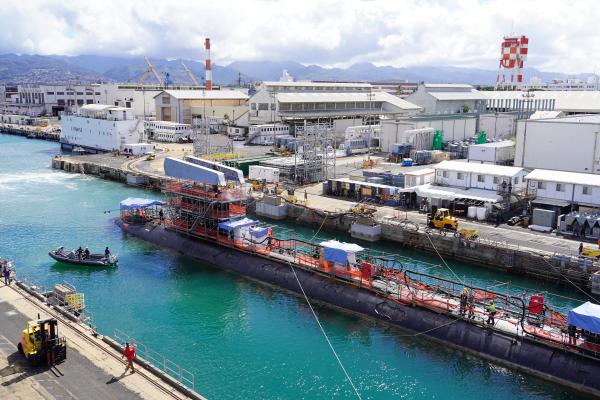
Hudson will welcome Senators Mark Kelly (D-AZ) and Todd Young (R-IN) to discuss their proposal to restore America’s shipping and shipbuilding industries to help deter Chinese aggression.
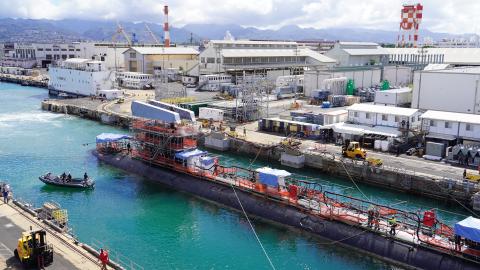

The Hudson Institute Political Studies Policy Certificate Program gathers talented early career professionals for advanced study of American foreign and domestic policy and national security, led by policy experts and experienced government officials.

